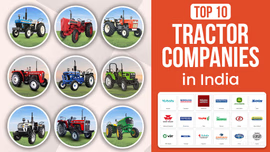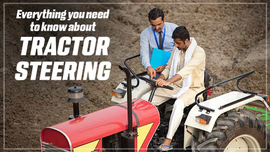Air Filters in Tractors: Types, Benefits, and Maintenance Tips

Table of Contents
- Introduction
- Need of Air filter in tractor engine
- Role of Air Filters in the performance of tractors
- Types of Air Filters
- Maintenance Of Air Filter
Introduction
The air filter is a major component in tractors that helps in burning fuel wisely and enhance the power and performance of the engine. They are designed to protect the tractor engine from pollutants such as dust, dirt, and debris from entering the combustion unit. Air filters are porous materials that are generally attached near the engine and help in filtering the air from airborne contaminants before it reaches the engine. Air filters help to maintain an efficient combustion process that leads to better fuel efficiency, improved engine performance, and enhanced durability of the tractor. Regular maintenance and replacement of air filters from time to time help to ensure the proper functioning and increased lifespan of the tractor engine.
Need of Air filter in tractor engine
The connection between the tractor engine and air filters is vital for the effectiveness of tractors. The tractor engine is also known as an internal combustion engine, which converts fuel's heat energy into mechanical energy by burning the fuel inside the engine itself. The combustion process is carried out effectively only when the clean air reaches the engine. The clogged air filter can cause the engine to receive less air and consequently reduce its performance. It can also cause the engine to consume more fuel.
Role of Air Filters in the performance of tractors
Air filters are directly related to the performance of tractors. They are responsible for preventing dust, dirt, and other particles from entering the engine through the air intake system. By trapping these contaminants from reaching the engine, air filters ensure cleaner combustion and protect the engine parts from any sort of damage and misfunctioning. A clean air filter is essential for optimizing engine performance and extending the lifespan of the tractor. A clogged air filter can result in the less powerful tractor running less efficiently. It also increases fuel consumption leading to less mileage. To ensure that filters don’t accumulate airborne contaminants with time and regular use, they must be cleaned regularly.
Types of Air Filters
In the combustion process of tractors, it is essential to pass the clean air into the engine, which is ensured by mainly two types of filters i.e., dry air filter and wet air filter
Dry Air Filter
Dry filters are the most common type of filters employed in tractors due to their high capacity to capture contaminants. Some of the features of these filters are
- Folded structure- These filters are usually made of paper, foam, or fabric as their filtration material to capture contaminants and tiny particles of dust and grit. They are folded in the structure which gives them more space to trap the dust particles.
- Easy to maintain: Dry filters are simple to change and easy to maintain. They need to be changed regularly depending on the amount of usage and the manufacturer’s instructions.
- Climatic conditions: These filters perform well in dry climatic conditions where more dirt and dust particles are floating in the air. They are efficient in capturing particles of all sizes making them suitable for air filtering in tractors.
Wet Air Filter
The wet air filter is not very commonly used in tractors but works best in humid climatic conditions. They are also known as oil bath filters as the filter element in them is submerged in oil. When air flows through the oil, dust and dirt particles get trapped in the oil thus preventing them from reaching the engine. Some of the key features of these filters are
Climatic conditions: Wet filters are highly suitable for humid conditions as they offer water and dust resistance properties. The oil in the filter repels water and its sticky character traps all the dirt particles effectively.
Maintenance: Regular maintenance is needed for the proper functioning of these filters. The oil should be changed and the filter must be cleaned timely. The long-term operational cost depends on the number of times the oil is changed and the filter is cleaned or replaced.
Maintenance Of Air Filter
Maintenance of air filters is an essential step to enhance the performance of the engine and to increase the efficiency of fuel consumption. Here are some points that should be noted for proper maintenance of air filters in tractors.
Regular Inspection
Regularly checking the air filters for any signs of damage or clogging is crucial as it allows you to determine their condition based on whether the air filters need cleaning or replacement. It is better to diagnose the issue and resolve it before it starts impacting the overall performance of the tractor. A clean air filter ensures optimal supply of air to the engine so it is recommended to visually inspect the tractor’s air filter after every 50 to 100 hours of operation.
Cleaning The Air Filter
Regular cleaning of the air filter removes the dirt and debris that gets accumulated leading to the improved flow of filtered air to the engine, which is vital for its efficiency. The frequency of cleaning depends on which conditions and how often the tractor is used. As per manufacturers guidelines, air filter should be cleaned after every 50 to 100 hours of operation using compressed air, soft-bristle brush, pressure washing, chemical cleaning, and backflushing.
Replacement of Air Filter
However, if the air filter is extremely clogged and damaged and does not work effectively even after cleaning, it is better to replace it to protect the engine from further damage. It is important to replace the air filters at specific periods to maintain their performance. If the tractor works in conditions where there is more dirt and dust, then it is recommended to replace the air filter every 100-200 hours. Oil filters need to be replaced regularly with every oil change, whereas air filters are generally replaced less frequently.
We, at tractorkarvan, have provided all the required information related to tractors. You can learn everything in detail about their features, specifications & price. If you want to learn more about type of air filter in your tractor, you can visit our Tractorkarvan website, anytime to make an informed decision before buying a tractor.


Related Blogs












